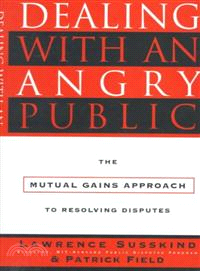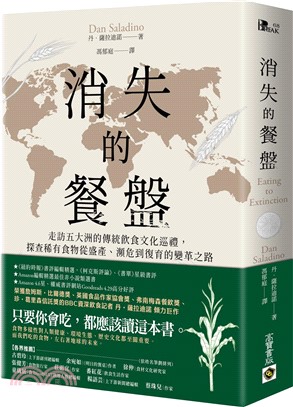DEALING WITH AN ANGRY PUBLIC: THE MUTUAL GAINS APPROACH TO RESOLVING DISPUTES
- ISBN13:9780684823027
- 出版社:JOHN WILEY & SONS;LTD
- 作者:PATRICK FIELD; LAWRENCE SUSSKIND
- 裝訂/頁數:精裝/280頁
- 出版日:1996/04/01
商品簡介
Some portion of the American public will react negatively to almost any new corporate initiative, as Disney discovered when it announced its plans to build an historical theme park in Virginia. Similarly, government efforts to change policy or shift budget priorities are invariably met with stiff resistance. In this enormously practical book, Lawrence Susskind and Patrick Field analyze scores of both private and public-sector cases, as well as crisis scenarios such as the Alaskan oil spill, the silicone breast implant controversy, and nuclear plant malfunction at Three Mile Island. They show how resistance to both public and private initiatives can be overcome by a mutual gains approach involving face-to-face negotiation, a strategy applied successfully by over fifteen hundred executives and officials who have attended Professor Susskind's MIT-Harvard "Angry Public" seminars.
Susskind and Field outline the six key elements of this approach in order to help business and government leaders negotiate, rather than fight, with their critics. In the process, they show how to identify who the public is, whose concerns to address first, which people and organizations must be convinced of the legitimacy of action taken, and how to assess and respond to different types of anger effectively. Acknowledging the crucial role played by the media in shaping public perception and understanding, Susskind and Field suggest a way to develop media interaction which is consistent with the six mutual gains principles, and also discuss the type of leadership that corporate and government managers must provide in order to combine these ideas into a useful whole.
We all need to be concerned about a society in which the public's concerns, fears and anger are not adequately addressed. When corporate and government agencies must spend crucial time and resources on rehashing and defending each decision they make, a frustrated and angry public contributes to the erosion of confidence in our basic institutions and undermines our competitiveness in the international marketplace. In this valuable book, Susskind and Field have produced a strong, clear framework which will help reduce these hidden costs for hundreds of executives, managers, elected and appointed officials, entrepreneurs, and the public relations, legal and other professionals who advise them.
作者簡介
目次
Acknowledgments
Chapter I. Introduction
A New Way of Interacting with the Public
Why We All Should Be Concerned About Angry Publics
The Public Is Not Easily Appeased
The Typical Approach to Public Relations Does Not Work
A Different Approach Is Needed
Chapter II. Why Is the Public Angry?
What Is Anger?
Why Are People Angry?
Rational and Irrational Anger
Typical Responses to an Angry Public
Dealing with an Angry Public: The Conventional Wisdom
Chapter III. The Mutual-Gains Approach
The Mutual-Gains Approach: Six Principles
The Old Plastics Factory
Background
Applying for a Waiver
Further Study
The Public Presentation
A Disaster Threatens
The Fallout
Chapter IV. Accidents Will Happen
Three Mile Island: To Tell or Not to Tell
The First Day: March 28, 1979
The Second Day: March 29, 1979
The Third Day: March 30, 1979
The Final Days: March 31 and April 1, 1979
Telling the Truth: The Mutual-Gains Approach
The Advantages of Disclosure Outweigh the Disadvantages
Act in a Trustworthy Fashion
Select a Capable Spokesperson
Enlist Support on the Outside
Government and Business Should, Can, and Do Cooperate
The Exxon Valdez: When Paying Out Doesn't Pay Off
Cleaning Up
A Modest Proposal
Exxon's Response
Mitigation Efforts
Compensation for Damages
The Aftermath
Doing It Differently: The Mutual-Gains Approach
The Company's Failure to Accept Responsibility
The Company's Failure to Establish Clear Lines of Communication
The Company's Failure to First Mitigate, Then Compensate (and Ultimately Leave People Better Off)
The Company's Failure to Convene an Effective Problem-Solving Forum
Conclusion
Chapter V. Risky Business
What Is Risk?
Assessing Risk
Perceiving Risk
Communicating Risk
Risky Business
The Breast Implant Controversy
The Story Unfolds
The Story Is Retold
What Should the Company Do?
Implant Rupture
Drawing Conclusions in the Face of Uncertainty
Knowing Your Product and Presenting It Truthfully: The Mutual-Gains Approach
Set Clear Performance Standards
Minimize the Risk, Not the Concerns of Others
Make Commitments You Can Keep
Seek to Know, Not to Hide
Engage Stakeholders in Making Risky Decisions
Make Contingent Commitments
Chapter VI. When Values Collide
What Are Values?
Why Are Value Conflicts So Difficult to Resolve?
A Model for Deescalating Intractable Conflicts
Hydro-Quebec and the Cree: Clashing Cultures
Hydro-Quebec's Response to the Cree
Talking With, Not At, the Other: The Mutual-Gains Approach
Seek Common Principles -- Despite Seemingly Stark Differences
Consider That You Might Be Wrong
Consider Substantial Community Improvement Through a Fair Process, Not Compensation Only for the Few
Ignoring the Principles of the Mutual-Gains Approach Intensifies Cultural Conflict
Animal Rights
Listening Whether You Agree or Not: The Mutual-Gains Approach
Examine History to Better Understand Today
Seek Reason Amid Emotion, Not Reason at the Expense of Emotion
Recognize Diversity on the Other Side
Beware the Pitfalls of "Rights Talk"
Seek Forums for Dialogue
Chapter VII. The Media
The Conventional Wisdom of Media Relations
The Media as Adversary
The Media as a Tool
The Media Can Be Controlled
Media Policy by Default
The Mutual-Gains Approach to Dealing with the Media
Take into Account the Interests of the Media
Tell the Media What You Know and Don't Know
Make Available People with Authority Who Can Share Their Views Openly
Work to Convince Media They Have an Educative Role
Use a Neutral to Speak in a Single Voice
In a Consensus-Building Process, Establish Ground Rules to Guide Media Interactions
Use Additional Means of Communication
Set an Example for the Media to Follow
Summary
Chapter VIII. Principled Leadership
Doing the Right Thing
Integrity, Honesty, and Trust
How to Inspire Trust
Sharing, Listening, and Learning
What Leaders Value
Leadership and Institutions
Concluding Remarks
Notes
Bibliography
Index
主題書展
更多主題書展
更多書展本週66折
您曾經瀏覽過的商品
購物須知
外文書商品之書封,為出版社提供之樣本。實際出貨商品,以出版社所提供之現有版本為主。部份書籍,因出版社供應狀況特殊,匯率將依實際狀況做調整。
無庫存之商品,在您完成訂單程序之後,將以空運的方式為你下單調貨。為了縮短等待的時間,建議您將外文書與其他商品分開下單,以獲得最快的取貨速度,平均調貨時間為1~2個月。
為了保護您的權益,「三民網路書店」提供會員七日商品鑑賞期(收到商品為起始日)。
若要辦理退貨,請在商品鑑賞期內寄回,且商品必須是全新狀態與完整包裝(商品、附件、發票、隨貨贈品等)否則恕不接受退貨。
























